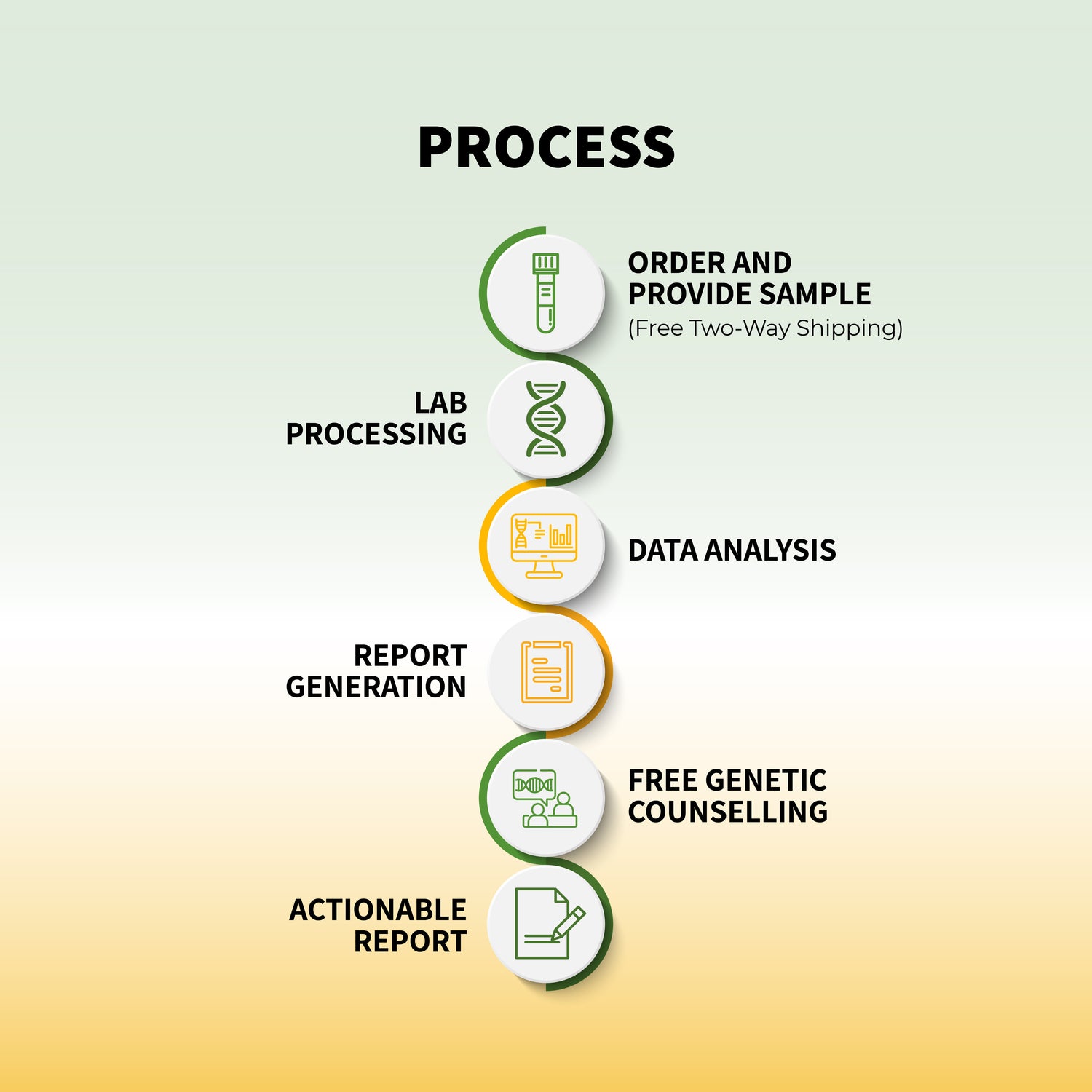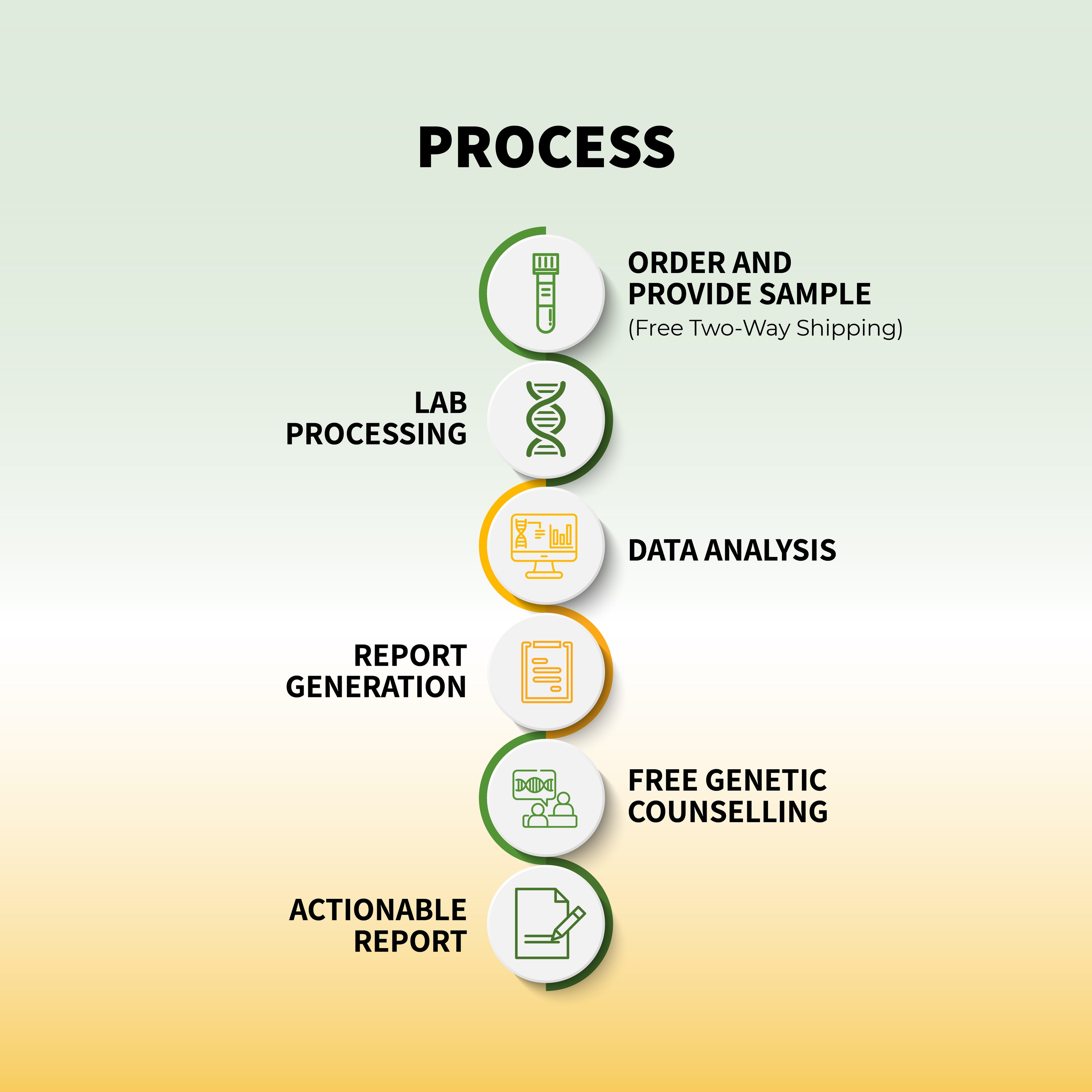आपका स्वास्थ्य ही आपकी संपत्ति है। हममें से ज़्यादातर लोग लंबे, स्वस्थ जीवन को सुनिश्चित करने के लिए निवारक उपाय करना चाहते हैं। इसलिए " पूरे शरीर की जांच " शब्द अक्सर एक-स्टॉप समाधान के रूप में सामने आता है। लेकिन क्या पूरे शरीर की जांच से सभी बीमारियों का पता लगाया जा सकता है? आइए इस विषय पर गहराई से विचार करें और इसके लाभों, सीमाओं और आनुवंशिक परीक्षण के साथ इसे जोड़ना क्यों अंतिम स्वास्थ्य रणनीति हो सकती है, इसका पता लगाएं।
पूर्ण शारीरिक जांच क्या है?
पूरे शरीर की जांच आपके समग्र स्वास्थ्य का एक व्यापक मूल्यांकन है। इसमें कई तरह के परीक्षण शामिल होते हैं जो महत्वपूर्ण अंगों, रक्त के स्तर और अन्य चीजों का मूल्यांकन करते हैं, जिसका उद्देश्य स्वास्थ्य समस्याओं को जल्दी से जल्दी पहचानना होता है।
पूर्ण शारीरिक जांच में क्या शामिल है?
- रक्त परीक्षण : इसमें सीबीसी, कोलेस्ट्रॉल, शर्करा स्तर और यकृत/गुर्दे की कार्यप्रणाली के परीक्षण शामिल हैं।
- इमेजिंग स्कैन : आंतरिक अंगों का आकलन करने के लिए एक्स-रे, अल्ट्रासाउंड या एमआरआई।
- हृदय स्वास्थ्य : ईसीजी और तनाव परीक्षण।
- कैंसर जांच : सामान्य कैंसर के लिए बुनियादी जांच।
ये परीक्षण आपको आपके स्वास्थ्य की एक झलक तो देते हैं, लेकिन हो सकता है कि ये सब कुछ कवर न करें।
क्या पूर्ण शारीरिक जांच से सभी बीमारियों का पता लगाया जा सकता है?
नहीं। हालांकि सामान्य बीमारियों और जोखिम कारकों का पता लगाने में पूरे शरीर की जांच अमूल्य है, लेकिन इसकी भी अपनी सीमाएं हैं।
वे क्या पता लगा सकते हैं
- जीवनशैली से जुड़ी बीमारियाँ : मधुमेह, उच्च रक्तचाप और उच्च कोलेस्ट्रॉल।
- सामान्य कैंसर : प्रारंभिक अवस्था में (जैसे, स्तन या प्रोस्टेट कैंसर)।
- अंग की खराबी : गुर्दे, यकृत या हृदय से संबंधित समस्याएं।
वे क्या भूल सकते हैं
- दुर्लभ आनुवंशिक विकार : आनुवंशिक उत्परिवर्तन के कारण उत्पन्न स्थितियाँ।
- मानसिक स्वास्थ्य स्थितियां : चिंता, अवसाद, या अल्जाइमर जैसी तंत्रिका संबंधी समस्याएं।
- उप-नैदानिक स्थितियाँ : बिना लक्षण के प्रारंभिक अवस्था में समस्याएँ।
- वंशानुगत जोखिम : कैंसर या हृदय रोग जैसी स्थितियों के प्रति संवेदनशीलता।
आनुवंशिक परीक्षण की भूमिका
यहीं पर जेनेटिक परीक्षण इस अंतर को पाटता है। एक मानक पूर्ण शारीरिक जांच के विपरीत, जेनेटिक परीक्षण आपके डीएनए में गोता लगाता है ताकि उन जोखिमों और प्रवृत्तियों का पता लगाया जा सके जो पारंपरिक परीक्षणों में अभी तक दिखाई नहीं दे सकते हैं।
आनुवंशिक परीक्षण क्यों महत्वपूर्ण है?
- वंशानुगत जोखिमों की पहचान करें : मधुमेह, हृदय रोग या कैंसर जैसी स्थितियों के लिए आनुवंशिक प्रवृत्तियाँ।
- व्यक्तिगत देखभाल : अपने आहार, फिटनेस और दवाओं को अपनी आनुवंशिक संरचना के अनुरूप बनाएं।
- शीघ्र हस्तक्षेप : जोखिमों का समाधान स्वास्थ्य समस्या बनने से पहले करें।
- परिवार नियोजन : गर्भावस्था नियोजन के लिए अपनी आनुवंशिक प्रोफ़ाइल जानें।
पूर्ण शारीरिक जांच बनाम आनुवंशिक परीक्षण
| पहलू | पूरे शरीर की जांच | आनुवंशिक परीक्षण |
|---|---|---|
| दायरा | वर्तमान स्वास्थ्य मुद्दे | भविष्य में आनुवंशिक स्थितियों का खतरा |
| शुद्धता | सामान्य संकेतक | सटीक डीएनए-स्तर की अंतर्दृष्टि |
| उदाहरण | जीवनशैली से जुड़ी बीमारियों का पता लगाएं | पूर्वाग्रहों के आधार पर बीमारियों को रोकें |
| आवृत्ति | प्रतिवर्ष या आवश्यकतानुसार | एक बार या जब आवश्यक हो |
व्यापक स्वास्थ्य रणनीति के लिए दोनों आवश्यक हैं।
पूरे शरीर की जांच कब कराएं?
समय का ध्यान रखना महत्वपूर्ण है। विशेषज्ञ उम्र, जीवनशैली और पारिवारिक इतिहास के आधार पर नियमित स्वास्थ्य जांच की सलाह देते हैं।
आदर्श समयरेखा
- 20 और 30 वर्ष : कोलेस्ट्रॉल, बीएमआई और शर्करा के स्तर जैसे बुनियादी स्वास्थ्य मापदंडों पर ध्यान दें।
- 40 और 50 की उम्र : हृदय स्वास्थ्य और कैंसर के लिए जांच शामिल करें।
- 60+ : दीर्घकालिक रोगों के लिए नियमित, विस्तृत जांच।
यदि आपके परिवार में किसी विशेष बीमारी का इतिहास है तो इसे आनुवंशिक परीक्षण के साथ संयोजित करें।
आनुवंशिक परीक्षण किस प्रकार पूर्ण शारीरिक जांच का पूरक है
आनुवंशिक परीक्षण को शामिल करने से निवारक स्वास्थ्य सेवा अगले स्तर पर पहुँच जाती है। कल्पना कीजिए कि आपको अल्जाइमर या हृदय रोग जैसी बीमारियों के जोखिम के बारे में सालों पहले ही पता चल जाए!
आनुवंशिक परीक्षणों के उदाहरण
- BRCA परीक्षण : स्तन और डिम्बग्रंथि के कैंसर के लिए।
- कार्डियो स्क्रीनिंग : हृदय रोग के जोखिम की भविष्यवाणी।
- फार्माकोजेनोमिक्स : जानें कि कौन सी दवाएं आपके लिए सबसे उपयुक्त हैं।
बेहतर स्वास्थ्य के लिए जीवनशैली संबंधी सुझाव
अधिकतम लाभ के लिए अपनी स्वास्थ्य जांच के साथ जीवनशैली में भी बदलाव करें।
1. संतुलित आहार
- अधिक फल, सब्जियाँ और साबुत अनाज खाएँ।
- प्रसंस्कृत खाद्य पदार्थ और चीनी का सेवन कम करें।
2. नियमित व्यायाम
- प्रतिदिन कम से कम 30 मिनट तक सक्रिय रहने का लक्ष्य रखें।
- इसमें शक्ति प्रशिक्षण और कार्डियो शामिल करें।
3. तनाव प्रबंधन
- ध्यान या योग का अभ्यास करें।
- प्रतिदिन कम से कम 7-8 घंटे सोएं।
4. नियमित जांच
- स्वास्थ्य जांच और टीकाकरण के बारे में अद्यतन जानकारी रखें।
पूर्ण शारीरिक जांच और आनुवंशिक परीक्षण के बारे में अक्सर पूछे जाने वाले प्रश्न
1. क्या पूर्ण शारीरिक जांच से आनुवंशिक विकारों का पता लगाया जा सकता है?
नहीं, यह मौजूदा स्वास्थ्य समस्याओं की पहचान करता है लेकिन आनुवंशिक जोखिमों का विश्लेषण नहीं करता। इसके लिए आनुवंशिक परीक्षण की आवश्यकता होती है।
2. मुझे कितनी बार पूरे शरीर की जांच करानी चाहिए?
यह आपकी उम्र और स्वास्थ्य पर निर्भर करता है। आम तौर पर, साल में एक बार इसकी सिफारिश की जाती है।
3. आनुवंशिक परीक्षण से किन बीमारियों की भविष्यवाणी की जा सकती है?
आनुवंशिक परीक्षण से मधुमेह, हृदय रोग, कैंसर और यहां तक कि अल्जाइमर जैसी बीमारियों के जोखिम का भी अनुमान लगाया जा सकता है।
4. क्या आनुवंशिक परीक्षण महंगा है?
लागत अलग-अलग होती है, लेकिन यह आपके स्वास्थ्य में एक बार का निवेश है।
5. क्या मुझे पूरे शरीर की जांच के स्थान पर आनुवंशिक परीक्षण करवाना चाहिए?
नहीं। वे एक दूसरे के पूरक हैं। पूरे शरीर की जांच वर्तमान स्वास्थ्य को संबोधित करती है, जबकि आनुवंशिक परीक्षण आपको भविष्य के जोखिमों के लिए तैयार करता है।
निष्कर्ष
पूरे शरीर की जांच अच्छे स्वास्थ्य को बनाए रखने के लिए एक महत्वपूर्ण उपकरण है, लेकिन यह कोई जादू की छड़ी नहीं है जो सब कुछ पता लगा ले। इसे आनुवंशिक परीक्षण के साथ जोड़ने से आपके स्वास्थ्य की पूरी तस्वीर मिल सकती है, जो वर्तमान को भविष्य की जानकारी के साथ जोड़ती है।
आज ही अपने पूरे शरीर की जांच करवाकर और जेनेटिक टेस्टिंग के विकल्पों को आजमाकर अपने स्वास्थ्य की जिम्मेदारी लें। आपका स्वास्थ्य इसके लायक है!

















